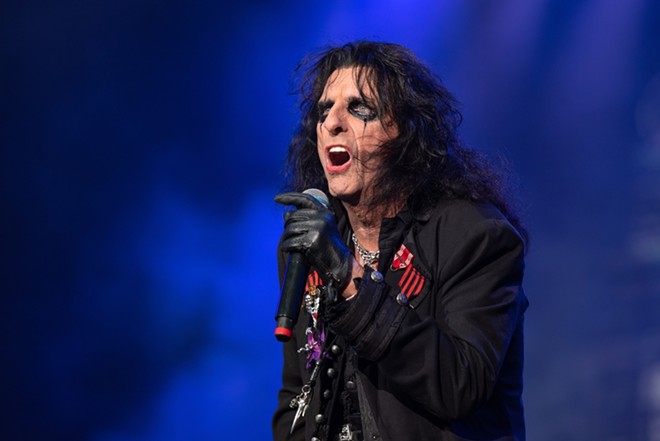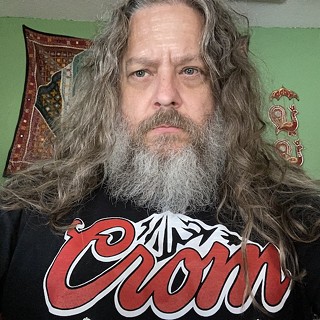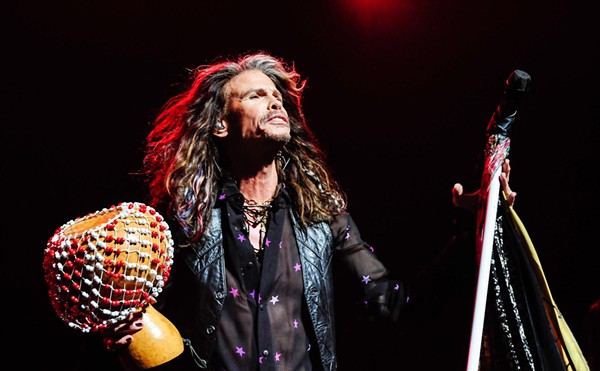At the age of 75, Alice Cooper has no interest in slamming on the brakes, or even easing back on the throttle a tad.
Despite being crowned one of the originators of shock rock, being inducted into the Rock & Roll Hall of Fame and emerging as one of the genre's surviving elder statesmen, he still performs roughly 180 shows a year. That includes tours fronting his own band and the Hollywood Vampires, a supergroup that also includes Johnny Depp and Aerosmith's Joe Perry.
And while many of his classic-rock contemporaries have abandoned the studio to focus on nostalgia tours, Cooper still releases albums of new material, which play to his strengths as a purveyor of dark humor and muscular hard rock. The latest, 2023's appropriately titled Road, was recorded largely without overdubs to show off the chops of his longtime touring band.
Cooper's latest tour will take him to San Antonio's Tobin Center for the Performing Arts on Tuesday, Aug. 22.
We caught up with the Coop from a hotel room in Boston at the very un-rock 'n' roll hour of 9:30 a.m. to ask him about the new LP, how he keeps a band together and his legendary guest spot on the Muppet Show. Here's what he had to say.
Even though Alice Cooper is credited as being a father of shock rock, it doesn't seem like you try to keep pace with new artists who come along trying to find new ways to terrify and offend. Was that a rat race you deliberately jumped out of?
You're exactly right. You cannot shock an audience anymore. ... In the '60s and '70s, it was very easy to shock an audience. If Alice Cooper came out, and he's got a snake and they're hanging him or they're cutting his head off, nobody had ever done anything like that, so it was very shocking. But in the end, the most important thing was how good was the band? That was really the important thing. We were up against Led Zeppelin, we were up against the best bands in the world, so we would spend 90% of our time on the music and about 10% of the time on the theater. That came easy, the theater part was the easy part.
So yeah, really, I don't go out of my way to shock an audience at all. I think our show is a dark vaudeville. We do all the hits, but every single song has got some kind of vehicle to it, some sort of theatrical vehicle.
That seems like a perfect segue for talking about the new album Road. As I understand it, you really wanted it to capture the sound of the band live on stage, minimal overdubs or no overdubs. Could—
Yeah, yeah, it's really just to show off the band, to be honest with you. The whole idea was I want to show the audience how big this band is. So, they're not just doing songs they've done before. We're writing the songs, and they're doing them live in the studio in two takes. So, to me, I really wanted to tip my hat to how good this band is live.
A lot of people in your position could go out with a band of anonymous sidemen. But during a good chunk of your more recent career, you've had folks in your band who are well known enough — Nita Strass, for example — to tour on their own. How do you keep a crack band together as a unit?
Well, it starts at the top. [Longtime manager] Shep Gordon and I have always treated the guy that sweeps the floor the same way we treat the lead guitar player. I always tell everybody in the whole organization, "I can't do what I do unless you do what you do." And so, what I try to instill in the band is that I want them to be as proud in this show as I am. I want them to have ownership in this show. When people talk about, "Wow, this show is so great," I say, "That's not just me, that's you guys." And I only hire people I really like.
You can fill your band with a bunch of incredible players, but if their egos are so incredibly huge, it's the most miserable thing in the world. Whereas, this band is as good as anybody I've ever played with, and they're all best friends. Because I think I try to instill that — if it's the bus driver's birthday, we have a birthday party. I want everybody to feel like they are important in the production of the show. ...
So yeah, of course the music comes first. That's what we really, really, really spend our time on. That's the cake. Once you've got the cake then you can put the icing on it — and that's all the theatrics to go with it.
I know you have an outside company that you've worked with for a long time to make the stage theatrics possible. How hands-on are you in putting together the stage show, deciding what new stuff you want them to try?
Everything. Myself and Shep Gordon and my wife, Sheryl [Goddard], who is the choreographer, we are the ones that basically design the show. This new show — it's called Too Close For Comfort — we have never used video before in our shows, ever. And so ... if Alice is in a straitjacket and he's trying to get out, normally the people in the back can't really see the claustrophobia involved in that. Now, they can see it on a screen, and they can really be involved in that. So, we decided, "OK, now, let's design these videos to compliment what the lyrics are."
So yeah, it takes a lot of pre-thought. The hardest thing about our tour is the set list, because you've got 30 albums to go to. And you want to make everybody happy, but you have to do the hits, and you have to do the stage hits. And that gives you about maybe two songs to put in from the new album. It doesn't give you much room to wiggle. So, we have to pick two songs from the new album and see where they fit into the show.
Looking back on those 30 albums, you once tried to keep up with trends, taking turns into new wave, then hair metal. But it seems like the past couple of decades you've kind of stuck to an approach that's a little bit heavier and not tied into current radio sounds.
Well, the one music that won't go away is hard rock. I think that all other genres of the rock world have had their life and go away. And the only thing that keeps going is hard rock: Guns N' Roses, Aerosmith, Alice Cooper, the Rolling Stones. Those are the bands that can go on as long as we want to go. Because we're based in guitar-driven hard rock. The only difference with me is I try to make those lyrics very clever, telling a story. ...
In common with a lot of people my age, seeing you on the Muppet Show was a fun experience, because it put a persona to the voice I'd heard on the radio. And then when you showed up again in Wayne's World in the '90s, I have to assume it did the same for new generation of fans. What contemporary TV show or movie franchise would you love for Alice to appear in?
So, doing the Muppet Show was one of the two things I'm proudest of. Because when the Muppets came out, it was the No. 1 show in the world. It wasn't just for kids; it was very funny, and it was written very cleverly so that adults could get it. It worked on a lot of levels. And when they approached me with it, I went, "Oh, man, I've spent all this time making Alice the villain of rock 'n' roll, and I really don't want to water it down. As much as I love the show, I don't want to water it down by being on the Muppets."
But I asked them, I said, "Who's been on the show recently?" And they said, "Well, we had Christopher Lee and Vincent Price." And I went, "I'm in!" Because if those guys can do it, I can do it. And then they came up with the idea of the whole Faust thing. I said, "Oh, that's going to bring me money." I never had more fun in my life than the week that I spent with the Muppets. You get to a point where you're talking to them like they're people. You really, actually get sucked into it. You're sitting there and you get done with a take and Kermit says, "You want to do lunch now?" And I go, "Yeah, what are they having?" And I'm talking to Kermit like I would talk to my bass player.
And the other thing I mentioned that I'm proudest of was working with Gene Wilder. Gene Wilder had a TV show that lasted two seasons called Something Wilder. And I played his next door neighbor — his noisy next door neighbor. And I'm doing one-on on comedy to a live audience with Gene Wilder. To me, that was an education in comedy because it was all about timing. It was all about this, and it was live. So, I really had to learn from the best, and Gene Wilder was the best.
Coming back around to the question, is there a contemporary movie franchise or a TV show that you'd love to have a guest spot on?
Well, I love when I see Alice either on Family Guy or The Simpsons and things like that. But I'm always going to be cast as a villain, so I would love to be a James Bond villain. I would love to be [recurring Bond baddie Ernst Stavro] Blofeld's grandson, who is just a really horrible, horrible guy that Bond has to deal with.
Subscribe to SA Current newsletters.
Follow us: Apple News | Google News | NewsBreak | Reddit | Instagram | Facebook | Twitter| Or sign up for our RSS Feed


















